Tale of Cinema Blu-ray Movie
HomeTale of Cinema Blu-ray Movie 
극장전 / Geuk jang jeonArrow | 2005 | 90 min | Not rated | No Release Date
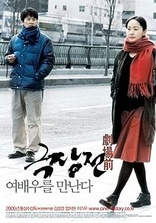
Price
Movie rating
7 | / 10 |
Blu-ray rating
| Users | 0.0 | |
| Reviewer | 4.0 | |
| Overall | 4.0 |
Overview
Tale of Cinema (2005)
In Seoul, the paths of two men and one woman intersect and move apart from one another, centering around their love for cinema. A suicidal student meets a young woman who decides to follow him in his fatal gesture. Coming out of a cinema, Tongsu, an unsuccessful filmmaker, spots a beautiful young woman, and recognizes her: she is the main actress in the film he has just seen. The life of this wavering and distressed young man strangely echoes the one of the young man from the beginning...
Starring: Kim Sang-kyung, Uhm Ji-won, Lee Ki-woo, Joong-hyeon Bang, Kyung-jin LeeDirector: Hong Sang-soo
| Foreign | Uncertain |
| Drama | Uncertain |
| Romance | Uncertain |
Specifications
Video
Video codec: MPEG-4 AVC
Video resolution: 1080p
Aspect ratio: 1.86:1
Original aspect ratio: 1.85:1
Audio
Korean: DTS-HD Master Audio 2.0
Korean: DTS-HD Master Audio 5.1
Subtitles
English
Discs
Blu-ray Disc
Single disc (1 BD)
Playback
Region A (B, C untested)
Review
Rating summary
| Movie | 4.0 | |
| Video | 4.0 | |
| Audio | 4.0 | |
| Extras | 2.0 | |
| Overall | 4.0 |
Tale of Cinema Blu-ray Movie Review
Reviewed by Jeffrey Kauffman July 19, 2018Note: This film is available as part of Woman Is the Future of Man + Tale of Cinema: Two Films by Hong Sangsoo.
Is Arrow Video holding Tony Rayns hostage? Rayns, inerrantly cheery as usual (Stockholm Syndrome?), is back again on another Arrow release
offering an overview of both Hong Sang-soo’s filmography in general as well as Woman is the Future of Man and Tale of Cinema in
particular, and it’s perhaps salient to note that Rayns starts out his supplementary analysis by stating that Hong is virtually unknown in the United
Kingdom (as happens quite often with Arrow releases, Arrow Academy has brought out Woman is the Future of Man + Tale of Cinema: Two Films by
Hong Sangsoo in the UK more or less simultaneously with this domestic release, and so some of Rayns' statements seem aimed at a British
audience). My hunch is as unknown as Hong may very well be on
that side of the pond, he’s probably even less recognized on this side of the pond, but as Rayns more or less alludes to in his
comments, there may be no better place to start getting to know this interesting South Korean auteur than with the two films Arrow has
compiled for this release.
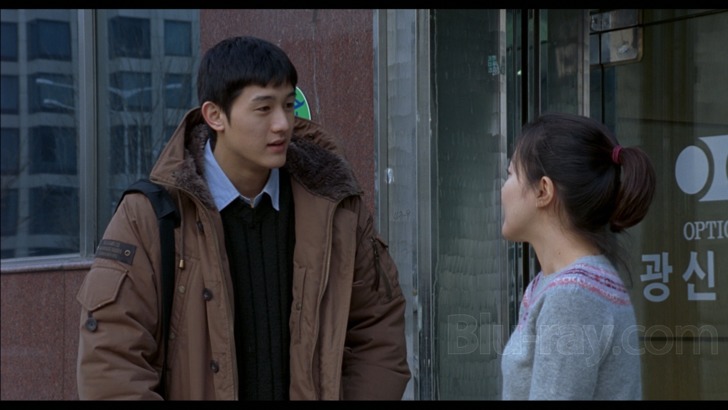
Spoiler-phobes may want to steer clear of both Tony Rayns’ analysis of Tale of Cinema and the back cover of the release itself since both contain a major revelation about the structure of this film that may in fact make it a bit easier to understand but which removes one of the prime surprises of a first viewing. Suffice it to say that the whole first section of Tale of Cinema is not exactly what it appears to be, and in fact those who get swept up in its tale of an abortive suicide pact may be scratching their heads at around the 45 minute mark when suddenly everything goes into “and now for something completely different” mode.
The opening section of the film tells the anguished tale of Jeon Sang-won (Lee Ki-woo) who (kind of like the relationship in Woman is the Future of Man) reunites with an old girlfriend Choi Young-shil (Uhm Ji-won), and both of whom then enter into a suicide pact that Rayns suggests may be based on a similar (solo) attempt that Hong reportedly made during his younger years.
There is family discord on tap in this opening sequence, but then suddenly everything changes with a rather strange segue that won’t be spoiled here but which may take more than one viewing of the film to fully assimilate. Without revealing the link between the first section and the second section, suffice it to say that the film then moves on to the story of Kim Dong-Soo (Kim Sang-kyung), who is (kind of like the character of Kim Hyeon-gon Woman is the Future of Man) a struggling filmmaker who meets an actress he’s seen in a film and begins kind of stalking her.
Again, while trying to maintain an aura of discretion so as to not ruin the initial viewing experience, it’s obvious that Hong wants to play with viewers’ perceptions of what watching a film really amounts to, and how one’s viewing experiences spill into “everyday” life. It’s interesting to note that Rayns considers this film more “straightforward” than Woman is the Future of Man, and in terms of its chronology, that may well be the case, but Tale of Cinema is a fascinating, multi-layered offering that almost requires at least a second viewing to fully appreciate the structural peculiarities that are on tap.
Tale of Cinema Blu-ray Movie, Video Quality 
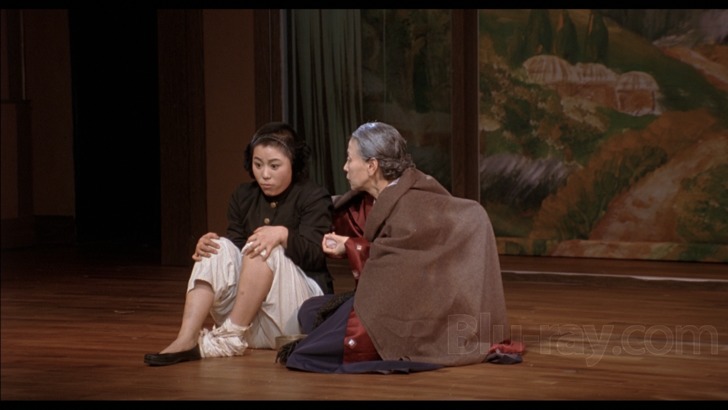
Woman is the Future of Man and Tale of Cinema are presented on Blu-ray courtesy of Arrow Academy with AVC encoded 1080p transfers in 1.85:1 (Woman is the Future of Man) and 1.86:1 (Tale of Cinema). Arrow's insert booklet contains the following fairly generic information on the transfers:
Woman is the Future of Man and Tale of Cinema are presented in their original aspect ratios of 1.85:1 [sic] with optional 2.0 and 5.1 audio. The masters were preared in High Definition by MK2 and delivered to Arrow Films.Tale of Cinema features an occasionally "video"-esque looking transfer, especially in its opening moments, but perhaps the most striking stylistic difference between this film and Woman is the Future of Man is Hong's pretty incessant use of zoom lenses, something that can give at least the perception of softness with sudden changes within the frame. While detail levels are probably more or less equal to those seen in Woman is the Future of Man, they can appear somewhat variable at times due to the peripatetic zooming. Grain is again somewhat variable, but is easily visible in some of the more brightly lit outdoor moments (or even moments that show scenes of outdoor locations taken from inside, as evidenced by screenshot 10).
Tale of Cinema Blu-ray Movie, Audio Quality 
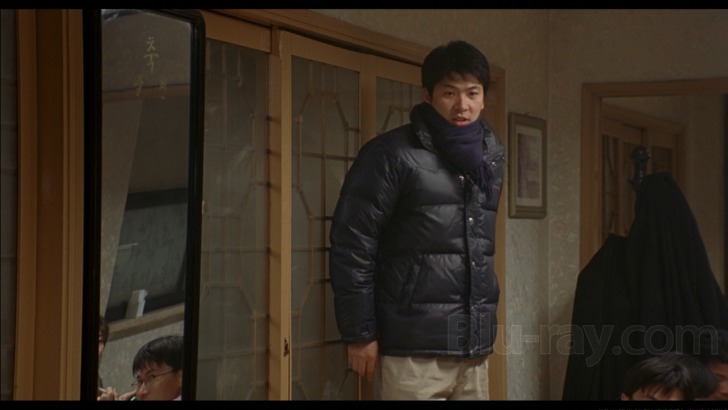
Both Woman is the Future of Man and Tale of Cinema feature DTS-HD Master Audio 2.0 and 5.1 tracks in the original Korean. Both films have somewhat anachronistic scores, and both of the scores open up quite a bit on the respective surround tracks, with at least somewhat fuller sounding mid- and lower ranges. Both films feature a glut of ambient environmental noise in various urban locations, and the surround tracks help to support the realism of those sequences as well. All of that said, both of these films aren't especially ambitious in their sound design, and both feature rather long sections that are pretty static with nothing but dialogue, and so the differences between the stereo and surround tracks are arguably fairly minimal at times.
Tale of Cinema Blu-ray Movie, Special Features and Extras 
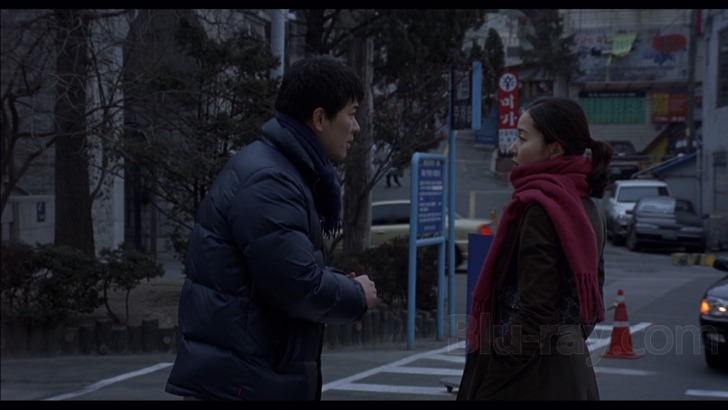
Arrow is offering both of Woman is the Future of Man and Tale of Cinema together on one disc, and kind of interestingly has
authored the disc so that separate special features appear
after each film is chosen.
Choosing Tale of Cinema offers the following supplements:
- Introduction by Tony Rayns (1080p; 20:50) features Rayns giving his thoughts on this film.
- Interviews with the Actors are in Korean with English subtitles and (also) come with brief (like 5 second) text introductions which
have kind
of strangely been authored as separate chapters:
- Kim Sangkyung (1080i; 14:13)
- Uhm Jiwon (1080i; 11:36)
- Lee Kiwoo (1080i; 7:05)
- Original Trailers
- Korean Theatrical Trailer (1080i; 2:30)
- French Trailer (1080p; 1:55)
- Stills Gallery (1080p; 11:30)
Tale of Cinema Blu-ray Movie, Overall Score and Recommendation 
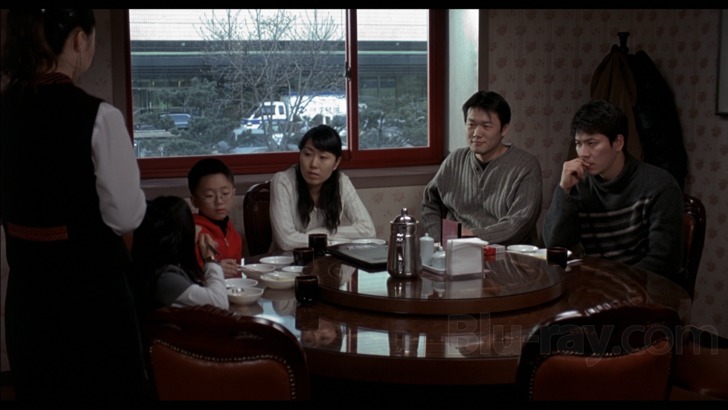
All is not as it seems in Tale of Cinema, though the very title of this film gives a salient clue as to what is "really" going on. Structurally, this film is fascinating, even if its narrative is a little muddled (not necessarily due to the structural complexities). Hong is obviously a thoughtful filmmaker, and this outing is really rather unexpectedly philosophical and should be enjoyed by those who tend to think about their viewing experiences at least as much as they have viewing experiences themselves. Technical merits are generally solid, and the supplements very enjoyable. Recommended.
Similar titles
Similar titles you might also like
(Still not reliable for this title)

Woman Is the Future of Man
여자는 남자의 미래다 / Yeojaneun namjaui miraeda
2004

Dust in the Wind
戀戀風塵 / Lian lian feng chen
1986

The Story of the Last Chrysanthemum
残菊物語 / Zangiku monogatari
1939

Le Combat dans l'île
Fire and Ice | Limited Edition
1962

Millennium Mambo
千禧曼波 / Qian xi man bo
2001

The Vanquished
I Vinti
1953

Nobody's Daughter Hae-Won
Nugu-ui ttal-do anin Haewon / 누구의 딸도 아닌 해원
2013

Les Dames du Bois de Boulogne
1945

The Lovers on the Bridge
Les amants du Pont-Neuf
1991

Fox and His Friends
Faustrecht der Freiheit
1975

Nights of Cabiria
Le notti di Cabiria
1957

Girl with a Suitcase
La ragazza con la valigia
1961

Suzhou River
苏州河 | Sū zhōu hé | 4K Restoration
2000

The Lovers
Les amants
1958

La vie de Jésus
The Life of Jesus
1997

Le bonheur
1965

Cléo from 5 to 7
Cléo de 5 à 7
1962

Kung-Fu Master!
Le petit amour
1988

Masculin Féminin
1966

Crisis
Kris
1946